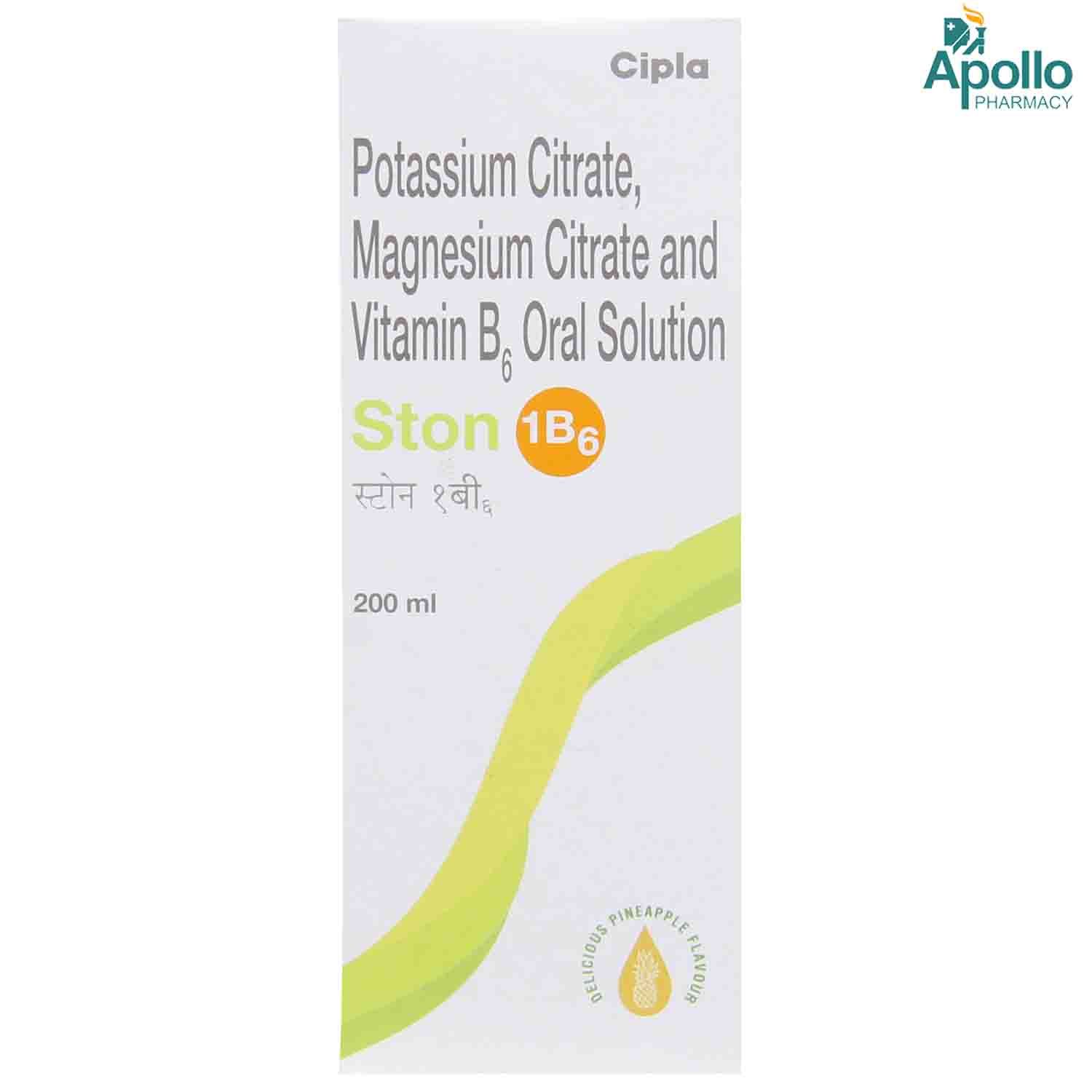Potassium Citrate+magnesium Citrate+pyridoxine Hydrochloride
About Potassium Citrate+magnesium Citrate+pyridoxine Hydrochloride
Potassium Citrate+magnesium Citrate+pyridoxine Hydrochloride is indicated for the treatment of renal tubular acidosis and kidney stones. It also helps provide relief from the burning sensation during urination. Kidney stones are small, hard deposits made up of calcium, phosphate, and other minerals/acid salts that stick together in concentrated urine. Renal tubular acidosis is a condition in which the kidneys fail to excrete acids into the urine. This causes the blood to remain too acidic.
Potassium Citrate+magnesium Citrate+pyridoxine Hydrochloride is a combination of three drugs: Magnesium citrate, Potassium citrate, and Pyridoxine hydrochloride. Potassium Citrate+magnesium Citrate+pyridoxine Hydrochloride raises the urinary pH, potassium, magnesium, and citric acid levels; this prevents the crystallization, growth, and accumulation of stone-forming salts.
Take Potassium Citrate+magnesium Citrate+pyridoxine Hydrochloride as prescribed. You are advised to take Potassium Citrate+magnesium Citrate+pyridoxine Hydrochloride for as long as your doctor has recommended it for you, depending on your medical condition. In some cases, you may experience certain common side effects, such as abdominal discomfort, diarrhoea, nausea, and vomiting. Most of these side effects do not require medical attention and will resolve gradually over time. However, you are advised to talk to your doctor if you experience these side effects persistently.
Consult your doctor before taking Potassium Citrate+magnesium Citrate+pyridoxine Hydrochloride if you are pregnant or breastfeeding. Potassium Citrate+magnesium Citrate+pyridoxine Hydrochloride is not recommended for children as safety and effectiveness have not been established. Potassium Citrate+magnesium Citrate+pyridoxine Hydrochloride is not recommended for patients with renal insufficiency as it might increase the risk for the development of hyperkalemia (high potassium levels) and soft tissue calcification. Keep your doctor informed about your health condition and medicines to rule out any side effects.
Uses of Potassium Citrate+magnesium Citrate+pyridoxine Hydrochloride
Medicinal Benefits
Potassium Citrate+magnesium Citrate+pyridoxine Hydrochloride is a combination of three drugs: Magnesium citrate, Potassium citrate, and Pyridoxine hydrochloride. Potassium Citrate+magnesium Citrate+pyridoxine Hydrochloride is indicated for the treatment of renal tubular acidosis and kidney stones, preventing the recurrence of calcium oxalate nephrolithiasis (calcium oxalate stones) and uric acid lithiasis (uric acid stones) with or without calcium stones. It also helps provide relief from the burning sensation during urination. Potassium Citrate+magnesium Citrate+pyridoxine Hydrochloride raises the urinary pH, potassium, magnesium, and citric acid levels; this prevents the crystallization, growth, and accumulation of stone-forming salts.
Directions for Use
Storage
Side Effects of Potassium Citrate+magnesium Citrate+pyridoxine Hydrochloride
- Abdominal discomfort
- Diarrhoea
- Vomiting
- Nausea
Drug Warnings
Do not take Potassium Citrate+magnesium Citrate+pyridoxine Hydrochloride if you are allergic to any of its contents; if you have hyperkalemia (high levels of potassium), chronic renal failure, uncontrolled diabetes mellitus, adrenal insufficiency, acute dehydration, oesophageal compression, delayed gastric emptying, intestinal obstruction, peptic ulcers, urinary tract infection, or renal insufficiency. Inform your doctor if you have hyperkalemia or gastrointestinal lesions. If you experience severe vomiting, gastrointestinal bleeding, or abdominal pain, stop taking Potassium Citrate+magnesium Citrate+pyridoxine Hydrochloride and consult a doctor immediately. Potassium Citrate+magnesium Citrate+pyridoxine Hydrochloride is not recommended for children as safety and effectiveness have not been established. Consult your doctor before taking Potassium Citrate+magnesium Citrate+pyridoxine Hydrochloride if you are pregnant or breastfeeding.
Drug Interactions
Drug-Drug Interactions: Potassium Citrate+magnesium Citrate+pyridoxine Hydrochloride may interact with diuretics (triamterene, spironolactone, amiloride) and anticholinergic drugs.
Drug-Food Interactions: No interactions found/established.
Drug-Disease Interactions: Potassium Citrate+magnesium Citrate+pyridoxine Hydrochloride may interact with conditions such as hyperkalemia (high potassium levels), delayed gastric emptying, intestinal obstruction, peptic ulcers, urinary tract infection, and renal insufficiency.
Drug-Drug Interactions Checker List:
Safety Advice

Alcohol
cautionIt is not known if alcohol interacts with Potassium Citrate+magnesium Citrate+pyridoxine Hydrochloride. Please consult a doctor.

Pregnancy
cautionPlease consult your doctor if you have any concerns regarding this; your doctor will prescribe only if the benefits outweigh the risks.

Breast Feeding
cautionConsult your doctor before taking Potassium Citrate+magnesium Citrate+pyridoxine Hydrochloride; your doctor will decide whether Potassium Citrate+magnesium Citrate+pyridoxine Hydrochloride can be taken by breastfeeding mothers or not.

Driving
safe if prescribedPotassium Citrate+magnesium Citrate+pyridoxine Hydrochloride is unlikely to affect your ability to drive. However, you are advised to drive only if you are alert.

Liver
cautionLimited information is available regarding the usage of Potassium Citrate+magnesium Citrate+pyridoxine Hydrochloride in patients with hepatic impairment. Please consult your doctor if you have liver problems or any concerns regarding this.

Kidney
unsafePotassium Citrate+magnesium Citrate+pyridoxine Hydrochloride might cause soft tissue calcification and hyperkalaemia in patients with renal insufficiency. Please consult your doctor if you have kidney impairment or any concerns regarding this.

Children
unsafeThe safety and effectiveness of Potassium Citrate+magnesium Citrate+pyridoxine Hydrochloride in children have not been established.
Habit Forming
Diet & Lifestyle Advise
Drink plenty of fluids as they help in flushing out excess minerals.
Limit salt intake. High amounts of salt can increase the risk of kidney stones.
Maintain a healthy weight by exercising regularly.
Avoid foods rich in oxalates such as spinach, nuts, okra, dates, avocado, hot chocolate, cocoa, baked potato, french fries, and cereals as they might increase the risk of oxalate stones.
Try maintaining optimum levels of calcium in the body as too little or high calcium can lead to kidney stones.
Patients Concern
Disease/Condition Glossary
Kidney stones: Nephrolithiasis, also known as kidney stones, is a disease affecting the urinary tract. Kidney stones are small, hard deposits made up of calcium, phosphate, and other minerals/acid salts that stick together in concentrated urine. They are the common cause of blood in urine and can be painful when passing through the urinary tract. Symptoms include severe pain, usually in one side of the abdomen, and nausea.
Renal tubular acidosis: This is a condition that involves the accumulation of acid in the body due to the failure of the kidneys to acidify the urine appropriately. The kidneys fail to excrete acids into the urine, which causes the blood to remain too acidic. If not treated, it could lead to kidney stones, bone disease, kidney disease, or failure.
FAQs
Potassium Citrate+magnesium Citrate+pyridoxine Hydrochloride is indicated for treating renal tubular acidosis and kidney stones. It also helps relieve the burning sensation during urination.
Potassium Citrate+magnesium Citrate+pyridoxine Hydrochloride raises the urinary pH, potassium, magnesium and citric acid levels; this prevents the crystallisation of stone-forming salts.
Do not discontinue Potassium Citrate+magnesium Citrate+pyridoxine Hydrochloride without consulting your doctor. To treat your condition effectually, continue taking Potassium Citrate+magnesium Citrate+pyridoxine Hydrochloride for as long as prescribed. Do not be reluctant to speak with your doctor if you feel any difficulty while taking Potassium Citrate+magnesium Citrate+pyridoxine Hydrochloride.
Avoid taking Potassium Citrate+magnesium Citrate+pyridoxine Hydrochloride if you have peptic ulcers, as Potassium Citrate+magnesium Citrate+pyridoxine Hydrochloride has ulcerogenic potential, which could lead to further ulceration. Consult your doctor if you have any concerns.
Diarrhoea might be a side-effect of Potassium Citrate+magnesium Citrate+pyridoxine Hydrochloride. Drink lots of fluids and eat non-spicy food if you experience diarrhoea. If you find blood in stools (tarry stools) or if you have severe diarrhoea consult your doctor. Do not take anti-diarrheal medicine on your own.
Consult a doctor before taking Potassium Citrate+magnesium Citrate+pyridoxine Hydrochloride if you have an active urinary tract infection as Potassium Citrate+magnesium Citrate+pyridoxine Hydrochloride increases the urinary pH, which might promote further bacterial growth.
To take Potassium Citrate+magnesium Citrate+pyridoxine Hydrochloride, shake the bottle well before each use. Measure the recommended dose using the provided measuring cup or spoon, and take it as directed by your healthcare provider or according to the label instructions.
People should not take Potassium Citrate+magnesium Citrate+pyridoxine Hydrochloride with certain conditions, including high potassium levels, chronic renal failure, uncontrolled diabetes, adrenal insufficiency, acute dehydration, oesophagal compression, delayed gastric emptying, intestinal obstruction, peptic ulcers, urinary tract infections, and renal insufficiency. Additionally, it is not recommended for children. If you have any of these conditions, inform your doctor before prescribing this medication.
You can take Potassium Citrate+magnesium Citrate+pyridoxine Hydrochloride only if your doctor prescribes it. Inform your doctor if you are already pregnant or planning to become pregnant. Your doctor will carefully consider the potential risks and benefits before prescribing it.
While taking Potassium Citrate+magnesium Citrate+pyridoxine Hydrochloride, avoid foods high in potassium, like bananas, oranges, potatoes, spinach, and tomatoes. Too much potassium can be dangerous. Also, limit foods high in oxalates, like nuts, chocolate, and tea, to help prevent kidney stones. It's best to consult a dietitian for personalized dietary advice and suggestions.
Before starting treatment with Potassium Citrate+magnesium Citrate+pyridoxine Hydrochloride, inform your doctor if you're allergic to any of its components or have certain medical conditions, such as hyperkalemia, chronic renal failure, uncontrolled diabetes mellitus, adrenal insufficiency, acute dehydration, oesophagal compression, delayed gastric emptying, intestinal obstruction, peptic ulcers, urinary tract infection, or renal insufficiency. Additionally, let your doctor know if you are pregnant or planning to become pregnant and breastfeeding. This will help avoid negative consequences and ensure optimal benefits.
While taking Potassium Citrate+magnesium Citrate+pyridoxine Hydrochloride, avoid certain medications to prevent interactions. These include antibiotics like tetracyclines and fluoroquinolones, bisphosphonates like Fosamax and Actonel, ACE inhibitors like Lisinopril, diuretics like furosemide, and proton pump inhibitors like omeprazole. Please note that this is not an exhaustive list. Inform your doctor about all medications, including over-the-counter drugs and supplements, to ensure safe usage. Your doctor will provide complete guidance.
The common side effects of Potassium Citrate+magnesium Citrate+pyridoxine Hydrochloride may include abdominal discomfort, diarrhoea, nausea, and vomiting. Most of these side effects do not require medical attention and will resolve gradually over time. However, you are advised to talk to your doctor if you experience these side effects persistently.
Available Medicines for
Potassium Citrate+magnesium Citrate+pyridoxine Hydrochloride

Lizerton B6 Sugar Free Orange Flavour Oral Solution 450 ml
1 Bottle
₹297.5 (MRP 330.5)10%Off
cashback: 0

Lithotrips B6 Sugar Free Raspberry Flavour Oral Suspension 200 ml
1 Bottle
₹216 (MRP 240)10%Off
cashback: 0

Citabest-B6 Sugar Free Raspberry Flavour Oral Suspension 200 ml
1 Bottle
₹180 (MRP 200)10%Off
cashback: 0







